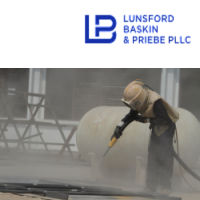The Dangers of Occupational Dust Exposure

Dust can be incredibly dangerous for a worker’s health. Employees who breathe in different types of toxic dust may experience short and long-term health problems, including respiratory issues. Although employers are supposed to notify and protect employees from potential dust hazards, many fail to properly educate their employees about the different types of toxic dust and their potential health risks.
If dust is a common problem in your workplace, you need to know about the different types of toxic dust, the different occupational illnesses associated with dust, and how you can receive compensation for dust-induced occupational illnesses.
Types of Toxic Dust
There are several different kinds of toxic dust that present health risks to employees. These include:
- Mold Dust: Molds can develop in unexpected areas of the workplace and remain unnoticed. It often grows in moist areas, so mold may appear in spaces affected by flooding or water damage. One way to distinguish mold dust from other types of dust is the smell. Mold often smells like rotten wood while other types of dust smell dryer.
- Vegetable Dust: Vegetable dust appears from organic items like wheat, cotton, grains, and more. Repeated exposure to vegetable dust can lead to long-term effects. Additionally, this type of dust can be combustible, so large amounts of vegetable dust can cause serious accidents.
- Metallic Dust: Metallic dust is made up of small pieces of aluminum, cadmium, lead, and other metal materials. This type of dust is common in manufacturing and other industries that involve metalwork. Metallic dust is poisonous if inhaled and is also highly flammable.
- Mineral Dust: When employees work with minerals, such as coal, they can become exposed to harmful chemicals in the dust. One common type of chemical is silica dust.
- Chemical Dust: Many different types of materials can expose workers to chemical dust, including paint, solvents, and pesticides.
Industries with a Higher Risk of Dust Exposure
Harmful dust is present in many industries. Unfortunately, some workers are almost guaranteed to be exposed to toxic dust because of the nature of their work. Industries that have a higher risk of dust exposure include:
Wood Industry
Wood processing creates a great deal of dust, so those working with wood are often exposed to harmful amounts of dust. In addition to the long-term respiratory issues associated with breathing in dust, wood dust is also highly combustible.
Agriculture
Agricultural workers process fibers that create dust. Grains and other natural materials go through a grinding process, creating dust and emitting harmful gasses.
Mining
Miners face exposure to mineral dust as they remove different types of minerals from the earth.
Construction
Construction workers face the risk of prolonged exposure to silica, which can be found in soil, rocks, concrete, and other common materials used on construction sites.
Occupational Illnesses Associated with Dust Exposure
Employees can develop a variety of occupational illnesses due to their prolonged dust exposure. Some of these include:
- Bronchiolitis obliterans: This illness is commonly known as “popcorn lung” because it’s incredibly common for employees who handle microwave popcorn and food flavorings to develop it. The illness is caused by scar tissue in the lungs, which prohibits proper airflow.
- Flock worker’s lung: Flock worker’s lung results from inhalation of nylon fibers called flock. People who inhale flock are at risk for interstitial lung disease which affects the interstitium in the lungs.
- Silo filler’s disease: This occurs from being exposed to nitrogen dioxide from crops. The nitrogen dioxide creates corrosive nitric acid in the lungs, which can lead to serious or fatal lung injuries.
- Mesothelioma: Mesothelioma is a type of lung cancer that occurs from asbestos exposure.
- Black lung disease: This disease is also known as coal workers’ pneumoconiosis because it occurs when people inhale coal dust. The coal dust results in lung scarring, which hinders people’s ability to breathe.
- Byssinosis: Also known as brown lung disease, this disease occurs when people are exposed to bacteria within flax, hemp, or cotton. The disease causes severe breathing problems and chest pain.
- Farmer’s lung: Farmer’s lung is an allergic disease that results from breathing in the mold of hay and other types of crops.
Hire a Louisiana Workers’ Compensation Attorney
Treating the different types of occupational illnesses caused by dust i
nhalation can be incredibly expensive, especially if you develop cancer such as mesothelioma. If you develop an occupational illness from dust in your workplace or another health hazard, you have every right to seek workers’ compensation. Employers are required to have either workers’ compensation insurance or self-insurance in Louisiana. Workers’ compensation covers medical expenses associated with occupational injuries and illnesses. It also covers any lost wages you may accumulate if you need time away from work.
Although receiving workers’ compensation should be a straightforward process, employers and insurance companies often look for ways to underpay or deny claims. If you’re injured or develop an illness because of your work, you need expert Louisiana workers’ compensation lawyers at your side to assist you with your claim.
Here at Lunsford, Baskin, and Priebe, PLLC, we have years of experience fighting for Louisiana workers and ensuring that they can maximize the amount they receive for workers’ compensation. Call our New Orleans office at 504-788-2994 or schedule a free case evaluation here.

